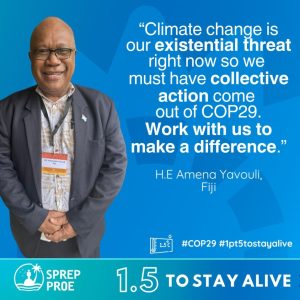As Pacific countries make their way to Baku, Azerbaijan, a new United Nations report cautioning that current national climate plans fall miles short of what’s needed to stop global heating from crippling every economy and wrecking billions of lives, has added impetus for Pacific delegates to further amplify the One Pacific Voice on 1.5 to stay alive.
The UNFCCC 2024 Nationally Determined Contributions (NDC) Synthesis Report has found that proposed actions by countries to mitigate the worsening impacts of climate change are woefully inadequate.
The report says greenhouse gas emissions hit a new record, sitting at 54 percent higher than in 1990. To limit global warming to 1.5 degrees Celsius, GHG emissions need to reduce 43% by 2030 relative to 2019.
The report, which assesses the combined impact of nations’ current national climate plans on expected global emissions in 2030, among other measures, was released on the eve of the 29th Conference of the Parties to the UNFCCC from 11-22 November 2024 in Azerbaijan.
Pacific delegations will be engaging in two weeks of crucial negotiations on tackling the climate crisis with urgency and ambition.

The Secretariat of the Pacific Regional Environment Programme (SPREP), as Chair of the One-CROP (Council of Regional Organisations of the Pacific), has the mandate as coordinator of Pacific climate change action to lead work on enhancing Pacific engagement at COP29.
“The One Pacific Voice is critical to the success of global negotiations such as COP29. Our Pacific communities are at the forefront of this escalating climate crisis, and we cannot be silent at these negotiations”, said SPREP’s Director of Climate Change Resilience, Tagaloa Cooper.
“Our Pacific Voice provides the moral compass in these negotiations and following months and months of preparatory work, our key asks at COP29 revolve around what is best for our Pacific communities.
“Firstly, we need “1.5 to stay alive” – our survival cannot be negotiated. A key issue at COP29 is the New Collective Quantified Goal (NCQG) for climate finance, which must deliver more accessible, simplified, new and additional finance to meet the needs of our Pacific communities.
“We will also advocate and fight for the Special Circumstances of SIDS, which are enshrined in the Paris Agreement. This must be protected.
“Lastly, enhanced transparency is critical for implementation, access to finance and accountability in keeping 1.5 alive. These are the priority messages we will be taking to the world in Baku.”
SPREP and One-CROP will work collaboratively with Vanuatu as the Chair of PSIDS and Samoa as the Chair of the Alliance of Small Island States (AOSIS) to support the Pacific’s collective aims in the global climate discussions.
John Salong, Vanuatu’s Minister of Climate Change Adaptation, Meteorology and Geo-Hazards, Energy, Environment and Disaster Management, as PSIDS Chair, said COP29 is taking place at a critical juncture in history.
“COP29 is happening at a crucial time in our region’s ongoing battle with climate change. It is critical that we continue to pressure larger emitters and those historically responsible for causing this crisis we find ourselves in, to increase their ambition to keep the 1.5-degree target alive,” he said.
“We believe COP29 is yet another opportunity to collaborate and urge our global partners to act with urgency to safeguard the lives of the people of Vanuatu, and everyone around the world, who depend on it.”
The UN Climate Change Executive Secretary, Simon Stiell, said COP29 must be the stand-and-deliver COP, recognising that climate finance is core business to save the global economy and billions of lives and livelihoods from rampaging climate impacts.
“As much of this finance as possible needs to be grant or concessional and must be made more accessible to those who need it most. And we must make climate cash count, wherever possible leveraging more private finance and sending signals to financial markets that green is where the gains are,” said Stiell.
“We must fund a new generation of national climate plans. And we must get the Loss and Damage Fund working fully, dispersing money to those who need it the most.”
The 29th Conference of the Parties to the UN Framework Convention on Climate Change (UNFCCC) is taking place from 11-22 November 2024 in Baku, the capital city of Azerbaijan.
It is being attended by Pacific leaders and their delegations, who are advocating for the survival of Pacific communities who continue to be at the forefront of climate change impacts.
A key part of amplifying the One Pacific Voice at COP29 is the Moana Blue Pacific Pavilion and the Pacific Delegation Office.
The Moana Blue Pacific Pavilion at COP29 is a Pacific partnership with the Governments of Australia and New Zealand managed by SPREP and the Pacific Delegation Office at COP29 is a Pacific partnership with the New Zealand Government managed by SPREP.












